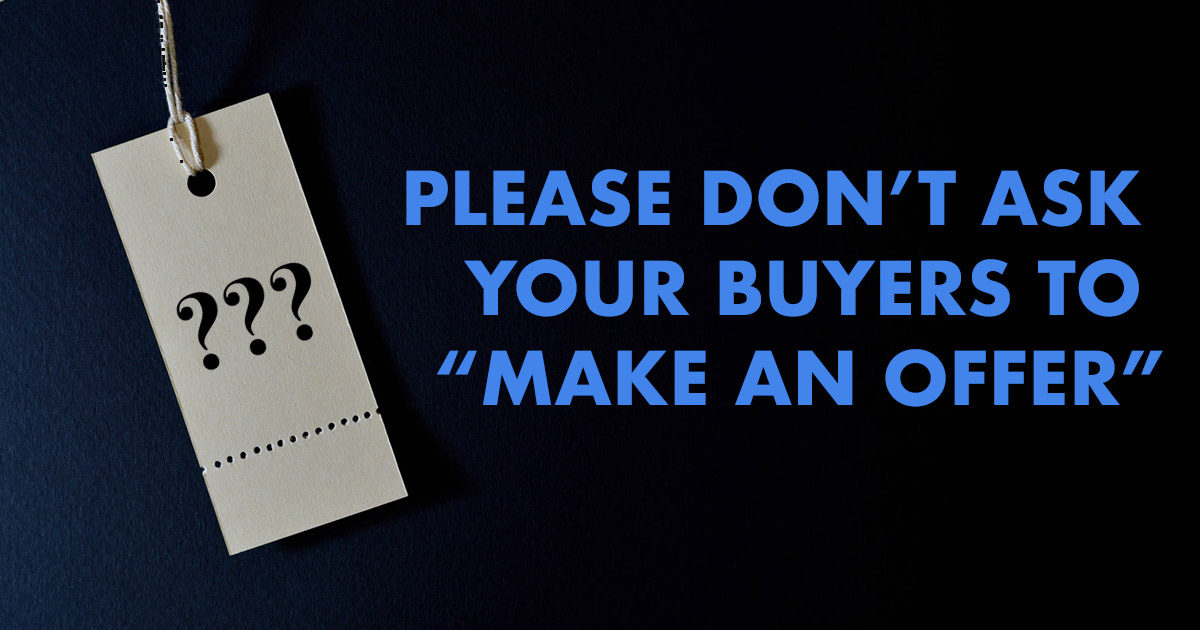Sellers – whether you are selling vintage electronic test gear, vacuum tubes, 78 rpm records, tube amplifiers, old radios, or vintage germanium transistors – you have two responsibilities to fulfill before you can truly call yourself a seller. Just two.
Your first job: Describe the item for sale as accurately you can
Take a few clear and well-lit photos of the item. Describe anything you know about the item – and anything you discover about the item while examining it.
- Does it work?
- Is it dirty?
- Is it in rough shape?
- Anything broken on it?
If you have no idea what you are selling – or if you can’t be bothered to examine the item you are selling – you can just say that too. If buyers have questions they will ask them.
Your second job: Put an ASKING PRICE on your item
Imagine a world where you go into a grocery store and nothing is priced. Imagine going to a gas station to pump gas and not knowing the price of the gas. Imagine going to a restaurant that has a menu with no prices on it. That would be crazy, right? Businesses are expected to provide prices to consumers.
Let me say that one more time: Your responsibility as a seller is to set an asking price.
Try to avoid the indignity of asking your prospective buyers to try to set the price for you. This is madness and will only waste everyone’s time by leading to an exchange such as this:
Seller: “I’m taking offers – make me an offer”
Prospective Buyer #1: “I can offer you $50”
Seller: “No way – I know this thing is worth way more than that!”
Prospective Buyer #1: “I could go up to $60”
Seller: “I’ve done my research – this thing is worth much more!”
Prospective Buyer #2: “Sorry but this is not worth more than $40”
Seller: “This item is over 70 years old! There’s no way it is worth that little!”
This could go on for days. To save everyone time and aggravation just name your asking price before you put it on the market!
If you feel that you cannot set an asking price, you have a couple of options:
- Do some research to try to get a better idea of how much similar items have sold for in the past
Today using a combination of Google, eBay completed/sold listings, and dedicated valuation sites (like Popsike or Discogs for records), it is easier than ever to get a sense for what something is worth – or at least in the general ballpark. - Ask a group of experts or collectors for advice on what they feel the item is worth
Warning – this approach may backfire. Jumping in a Facebook group to ask “What is this worth” will sometimes anger those in the group. To you, the item you are selling might be just a means to make some quick cash – but to collectors or hobbyists – this item may represent something much more.The other way this approach can backfire is if the experts tell you that your item is not worth as much as you had hoped – in which case some sellers will indignantly debate and argue rather than respectfully thank the group for their free valuation consultation.
- Put it up for auction and let the market decide.
Auctions are simple. You set a minimum bid, an end time, and agree to award the item to the highest bidder. The prospective buyers do the rest. This is different than “Make me an offer.” because auctions have a set structure. No haggling is necessary. Bids below the minimum will not be accepted. If the minimum bid is too high, sellers won’t bother bidding. If your item does not sell, lower your price and try again.The good news is that if you have an eBay auction – you can set a “Buy It Now” price and allow buyers to make offers. But this is different – by setting a “buy it now” price, you are signaling to prospective buyers what you believe the item to be worth – and thereby setting an asking price. By letting buyers know you will accept offers – you are also signaling that your asking price is flexible.
Do you agree? What’s the most frustrating experience you’ve had with a seller who asks for offers?
Do you disagree? Let me know in the comments – when is it better to ask for an offer rather than just setting an asking price?

